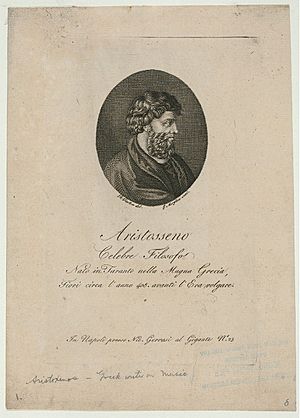Aristoxenus facts for kids
Aristoxenus of Tarentum (Greek: Ἀριστόξενος ὁ Ταραντῖνος) was an important Greek philosopher and a student of Aristotle. He was born around 375 BC in Tarentum, a city in ancient Greece.
Aristoxenus wrote many books about philosophy, ethics (which is about right and wrong), and music. Sadly, most of his writings are now lost. However, one important book about music, called Elements of Harmony, still exists, though it's not complete. This book is a main source for what we know about ancient Greek music. He also wrote some smaller pieces about rhythm and meter in music.
Contents
Life of Aristoxenus
Aristoxenus grew up in Tarentum. His father, Spintharus, was a skilled musician, and he taught Aristoxenus about music. Later, Aristoxenus studied with other teachers, including Lamprus of Erythrae and Xenophilus, who followed the ideas of Pythagoras.
Eventually, Aristoxenus became a student of the famous philosopher Aristotle. He was very good at many different subjects, just like Aristotle. Some stories say that Aristoxenus was upset after Aristotle died because Aristotle chose another student, Theophrastus, to lead his school instead of him. However, other ancient writers say that Aristoxenus always spoke about Aristotle with great respect. We don't know much about Aristoxenus's life after Aristotle passed away.
What Aristoxenus Wrote About
People say that Aristoxenus wrote an amazing 453 books! These books covered many topics, including philosophy, ethics, and music.
Even though he studied with Aristotle, Aristoxenus was also very much influenced by the ideas of Pythagoras. He grew up in Tarentum, a city known for Pythagorean thinkers like Archytas and Philolaus. His father's musical background also connected him to Pythagorean ideas about music.
However, Aristoxenus didn't agree with all the older Pythagorean ideas about music. He added his own thoughts. For example, earlier Pythagoreans believed that musical notes should be judged only by mathematical rules. But Aristoxenus thought that our ear should be the main judge of music. He believed that what sounds good to us is important, not just the math behind it.
The only complete work of his that we still have is the three books of Elements of Harmony, which is about music.
Elements of Harmony
In his book Elements of Harmony, Aristoxenus tried to explain everything about ancient Greek music in a clear and organized way.
- The first book talks about the different types of musical scales used in Greek music. It also defines important terms like sound, interval (the distance between two notes), and musical system.
- In the second book, Aristoxenus divides music into seven main parts. These include the types of scales, intervals, sounds, systems, modes (or musical styles), changes in music, and how melodies are created.
- The rest of the book goes into detail about these different parts of music.
Aristoxenus believed that "we judge the size of a musical interval with our hearing, and we understand its many powers with our mind." He also wrote that "the nature of melody is best found by listening, and it is remembered by our memory." He thought that there was no other way to truly understand music. He disagreed with those who said you only learn music by studying instruments. He felt that understanding the feeling and sound of music was more important than just the math.
He also pointed out that people don't always agree on how to divide musical scales. This shows that music isn't always about strict, unchanging rules.
Aristoxenus also described 28 rules for how melodies should move in music. These rules are very interesting for people who study classical Greek music.
On Rhythm and Meter
A part of another one of his books, called Elementa rhythmica, which was about rhythm and meter, has also survived.
Aristoxenus also wrote a book called On the Primary Duration, which likely discussed how long musical notes should last.
Other Writings
Aristoxenus wrote many other books on a wide range of topics. Some of these included:
- The lives of famous people like Pythagoras, Archytas, Socrates, and Plato.
- Books about different types of laws, like Educational customs and Political laws.
- Works about music, such as On music, On listening to music, and On melodic composition.
- Books about musical instruments, including On musical instruments, On aulos (a type of ancient Greek flute), and On auletes (people who played the aulos).
- Writings about dance and theater, like On choruses and On tragic dancing.
- Collections of notes and historical records.
Editions and Translations
Many scholars have worked to collect and translate Aristoxenus's surviving writings. Some important editions include:
- Andrew Barker's Greek Musical Writings, vol. 2 (1989), which has an English translation.
- Henry Stewart Macran's The Harmonics of Aristoxenus (1902), with Greek text and English translation.
- Fritz Wehrli's Die Schule des Aristoteles, vol. 2: Aristoxenos (1967), which has Greek text and commentary in German.
See Also
 In Spanish: Aristóxeno para niños
In Spanish: Aristóxeno para niños
- Plato's unwritten doctrines, for Aristoxenus's report on Plato's Lecture on the Good
 | Aaron Henry |
 | T. R. M. Howard |
 | Jesse Jackson |


